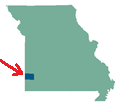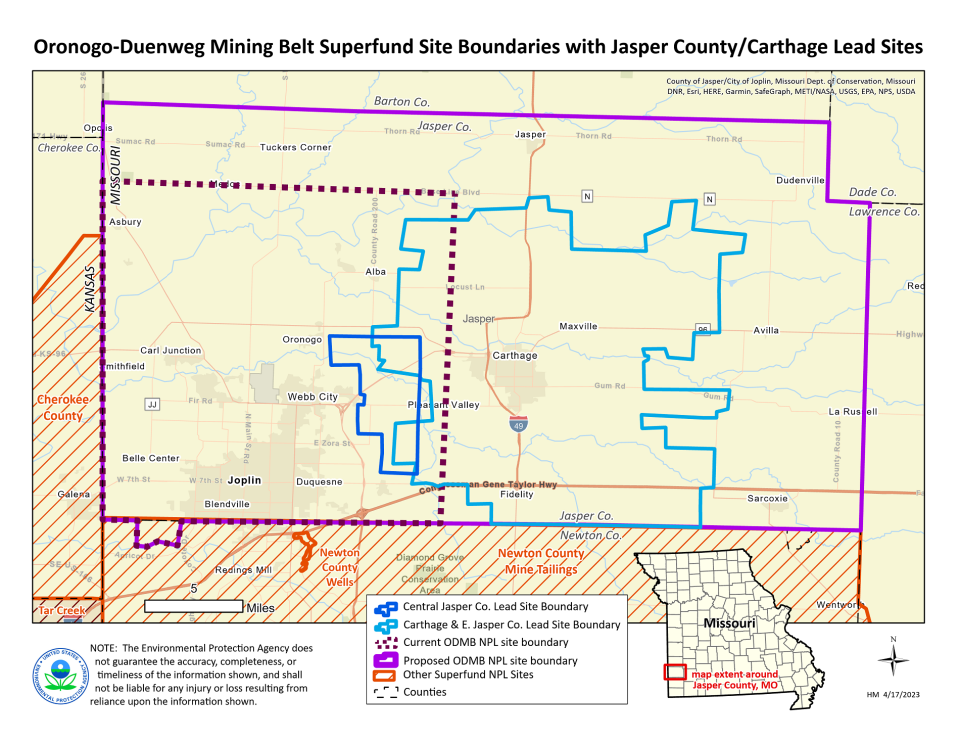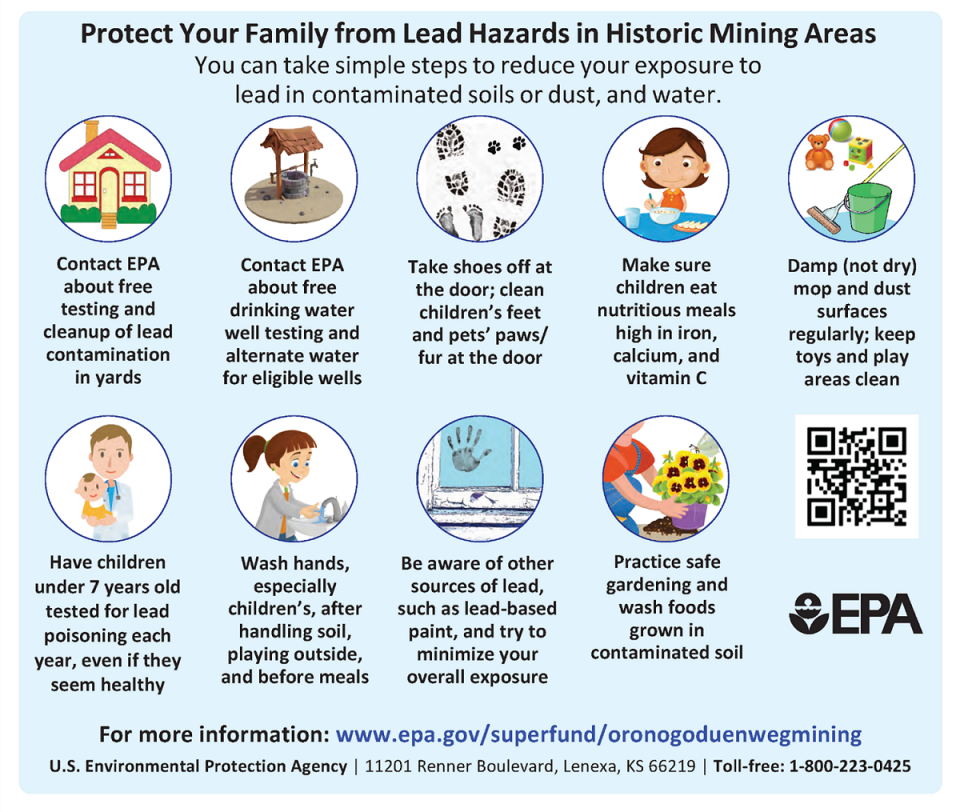Oronogo-Duenweg Mining Belt National Priorities List (NPL) Superfund Site, Jasper County, Missouri – Fact Sheet, April 2023
EPA to Host Open House with Site Update
Jasper County Health Department Will Offer Free Blood Lead Testing for Pregnant Mothers and Eligible Children
Site Update Overview

EPA Region 7 will hold an Open House on Monday, April 24 at Memorial Hall in Carthage, Missouri for the Oronogo-Duenweg Mining Belt National Priorities List (NPL) Superfund Site (site). Lead mine waste was spread throughout the area from historic mining activities in the Tri-State Mining District where mining, milling, and smelting of lead and zinc ore began in the mid‐1800s and continued for more than 100 years – contaminating soil, groundwater, and surface water sediments with lead, zinc, and cadmium.
Lead is a toxic metal that is harmful if inhaled or swallowed. Lead can pose serious health risks at low concentrations, particularly to children under 7 years old, as well as to those who are pregnant or nursing.
The event will be held:
Monday, April 24, 2023
6 to 8:30 p.m.
Memorial Hall
407 S. Garrison Ave.
Carthage, MO 64836

During the event, EPA will provide a site update presentation and discuss plans to expand the site boundary to include all of Jasper County (see map at right) to protect human health and the environment from site hazards.
Expanding the site boundary would enable EPA to conduct additional lead testing and cleanup of lead and zinc mining wastes found throughout the county.
EPA will also present information about short-term Removal actions conducted in Jasper County, the Superfund Remedial (cleanup) process, the Technical Assistance Needs Assessment (TANA), and the Community Involvement Plan (CIP) Update, with opportunities for the community to share their thoughts and concerns.
Following the presentation, EPA, federal, state, and local health and environmental agencies will be available to talk with residents in an Open House format.
Free Blood Lead Testing During Event
The Jasper County Health Department (JCHD) will conduct blood lead testing during the event – FREE for children from 6 months through 5 years old and pregnant mothers. For more information, contact the JCHD at: 417-358‐3111 or EPA Contacts on page 2. Some children in historic lead mining and smelting areas have elevated levels of lead in their blood. This can cause health problems. Children under 7 years old living in this area should have annual blood tests. Talk to your pediatrician, general physician, or local health department about testing your child. To arrange for blood lead screening outside of this event, please contact the Jasper County Health Department, 105 Lincoln St., Carthage, MO 64836; at 417-358‐3111.
What Has EPA Done to Date?
Sitewide, since 1995, EPA has assessed and cleaned up millions of yards of mining waste over thousands of acres, remediated thousands of residential yards, supplied hundreds of homes with a clean, permanent source of drinking water, and cleaned up over a dozen miles of streams. EPA also conducted several short-term residential yard cleanups to protect children’s health from immediate threats.
EPA R7 is currently assessing and cleaning up lead contamination in private domestic drinking water wells, residential yards, and areas of suspected mining waste within the site. For more information, see EPA's Fact Sheet.
EPA’s ongoing Remedial Activities for the overall ODMB NPL Site cover five overall project areas (also known as Operable Units or OUs):
- Mine and Mill Waste (OU-01)
- Residential Yards (OU-02 and OU-03)
- Groundwater (OU-04) and
- Spring River Basin (Watershed) (OU-05)
EPA’s short-term Removal Actions have identified and addressed residential yards and private, domestic drinking water wells with lead contamination, such as: Carthage City and Eastern Jasper County Lead, Central Jasper County Lead, Joplin Emergency Removal, and Jasper County Wells.
Early testing of private drinking water supply wells indicated that several wells were contaminated with lead, cadmium and zinc attributable to historic mining activities. EPA’s response actions provided bottled water, treatment systems, or city water connections to residences with contaminated private drinking water supply wells. EPA continues to test yards and private, domestic drinking water wells. EPA is targeting lead sampling efforts in areas with a high likelihood of lead contamination. EPA will reach out to properties for free sampling. For more information, contact EPA.
Lead Information and Site Details

EPA develops document collections to provide a clear understanding of EPA’s actions and decisions at a site. Site project information is available to the public at web information repositories. The Administrative Record File (AR File) contains technical documents from EPA’s response actions, Records of Decisions, and other cleanup documents, om EPA's Site Profile page at (see Site Documents & Data).
See AR Files for EPA’s Removal Actions at the Carthage City and Eastern Jasper County Lead Site and Central Jasper County Lead Site.
If you do not have internet access, you can view these documents online during normal business hours at these locations:
EPA Region 7 Records Center
11201 Renner Blvd.
Lenexa, KS 66219
1-800-223-0425
Joplin Public Library
1901 E. 20th St.
Joplin, MO 64804
417-623-7953
(via computer access)
More information about lead:
Technical Assistance Grant
To help affected communities understand the technical information related to a Superfund site, EPA has established a Technical Assistance Grant (TAG) Program. The program provides up to $50,000 for a qualified citizens’ group to hire an independent technical advisor. The advisor can assist citizens in their interpretation of technical data, site hazards, and the different scientific technologies used to support site actions.
Site Contacts
If you have questions about this Fact Sheet, need more information about the site, and/or would like to receive site updates, please contact EPA:
Community Involvement:
- Elizabeth Kramer, Community Involvement Coordinator; phone: 913-551-7186; email: [email protected] or R7 TSMD: [email protected]
Mining Waste Source Areas:
- Liz Blackburn, Remedial Project Manager; phone: 913-551-7899; email: [email protected]
Residential Yards:
- Dan Kellerman, Remedial Project Manager; phone: 913-551-7603; email: [email protected]
- Peyton Witham, Remedial Project Manager; phone: 913-551-7219; email: [email protected]
Groundwater/Private, Domestic Drinking Water Wells:
- Creenen McGuire: Remedial Project Manager; phone: (913) 551-7124; email: [email protected]
